新概念英语第二册lesson 30 Football or polo? 课件(共36张PPT)
文档属性
| 名称 | 新概念英语第二册lesson 30 Football or polo? 课件(共36张PPT) |
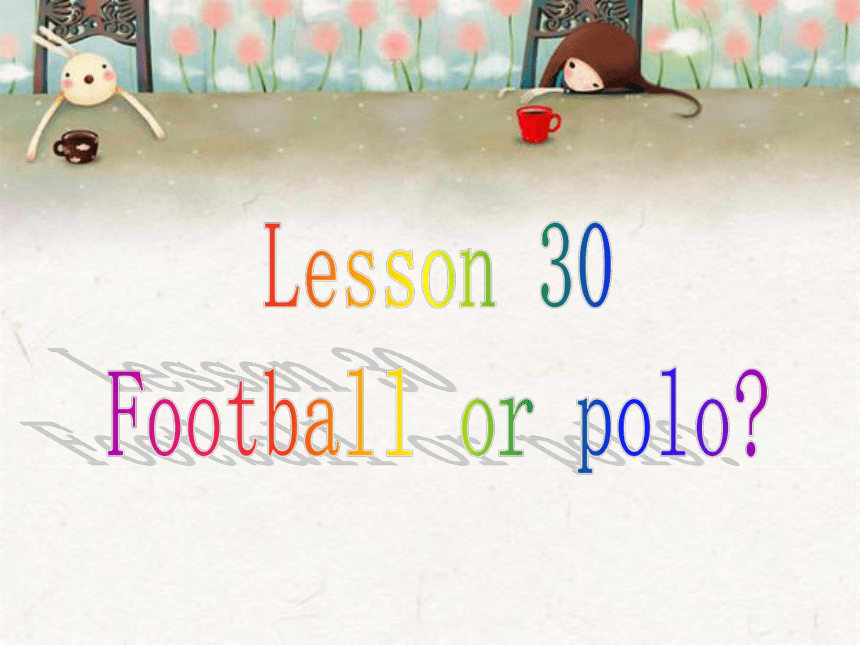
|
|
| 格式 | ppt | ||
| 文件大小 | 1.3MB | ||
| 资源类型 | 教案 | ||
| 版本资源 | 新概念英语 | ||
| 科目 | 英语 | ||
| 更新时间 | 2023-10-06 00:00:00 | ||
图片预览



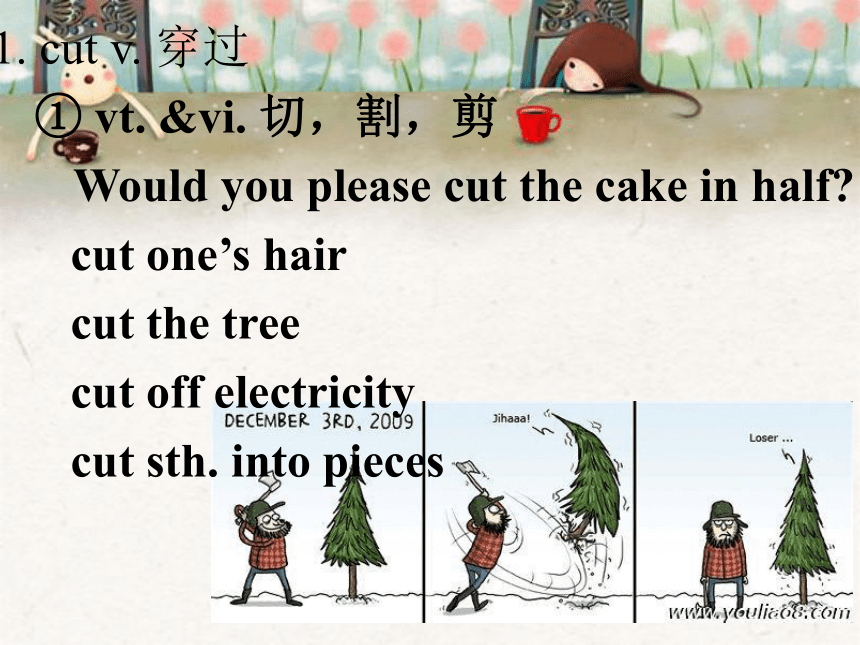
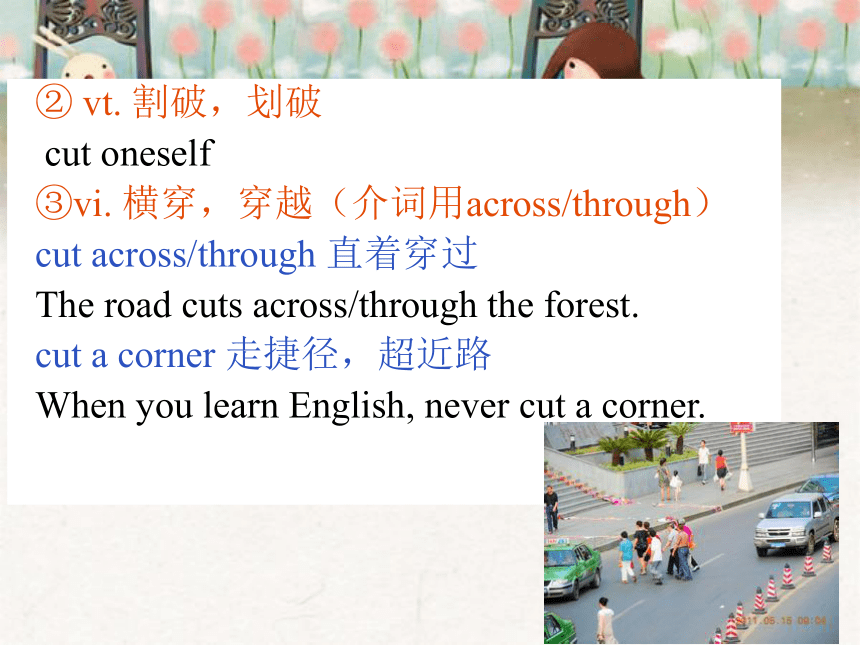
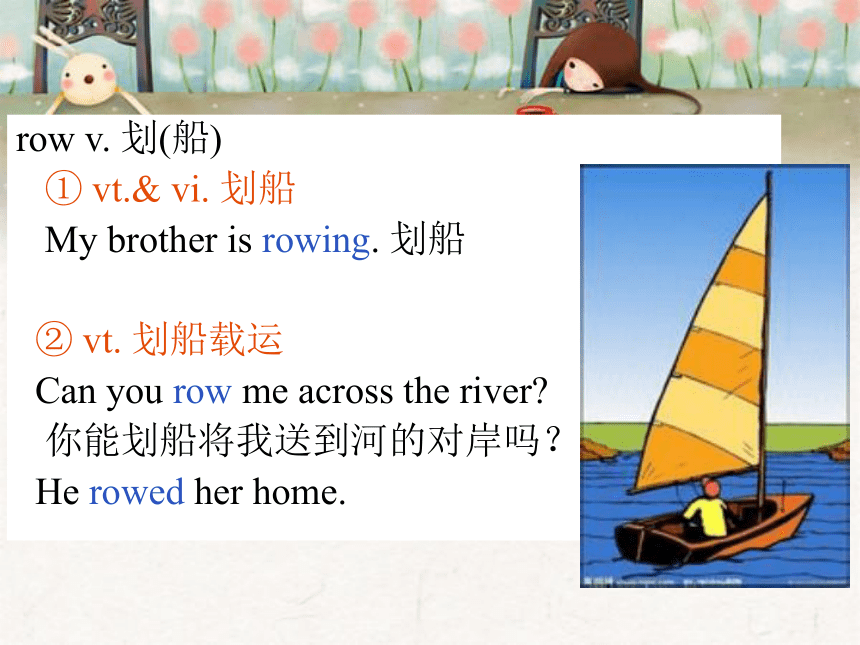
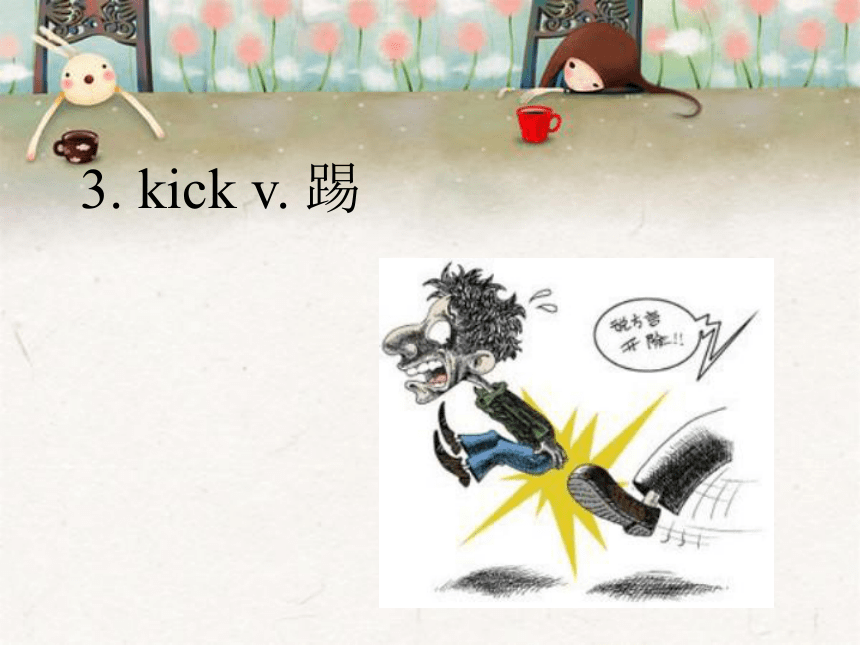
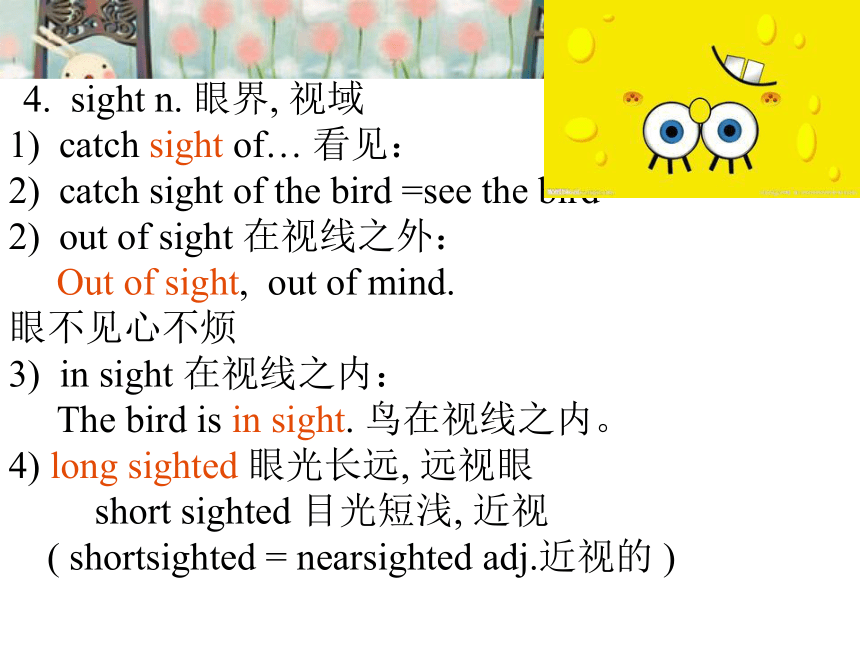
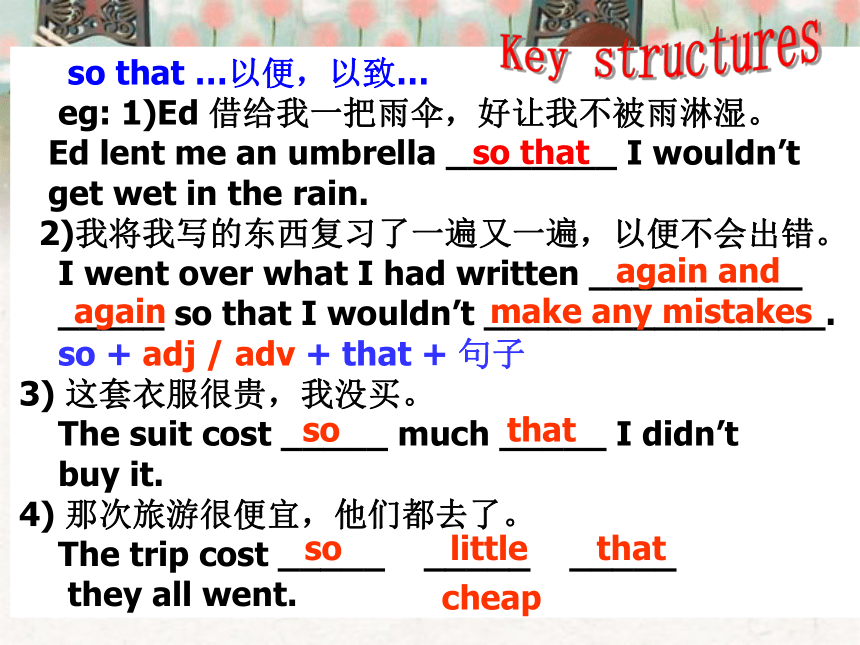
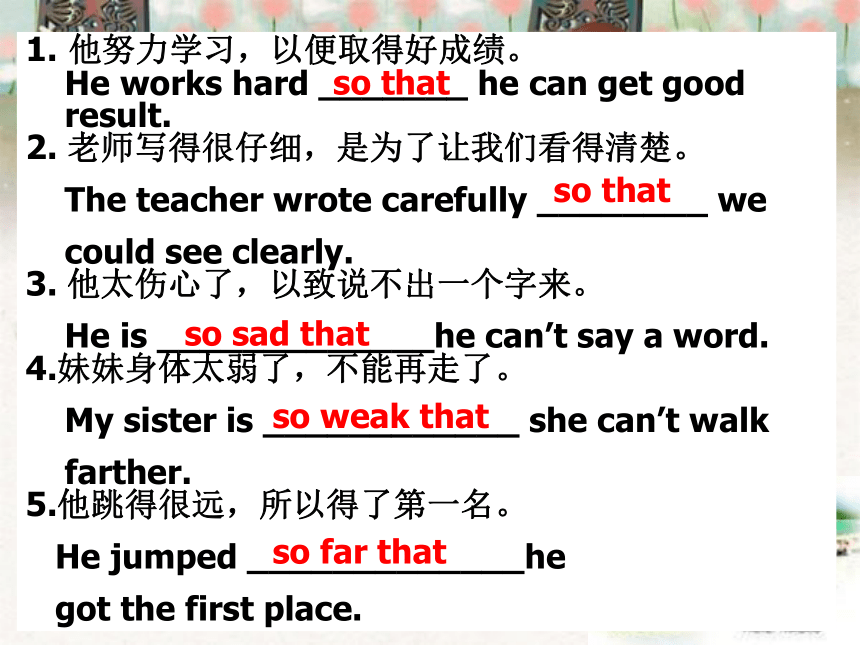
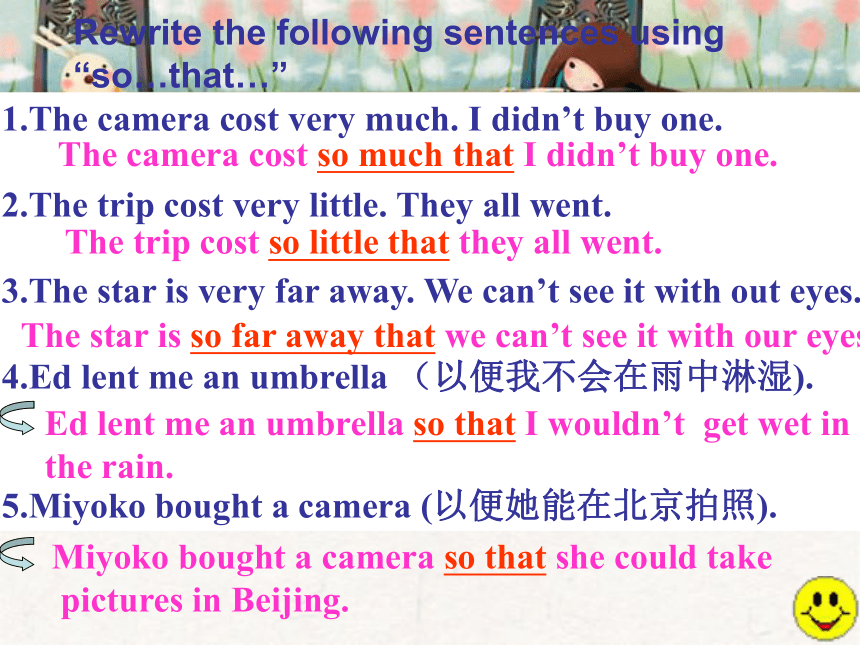
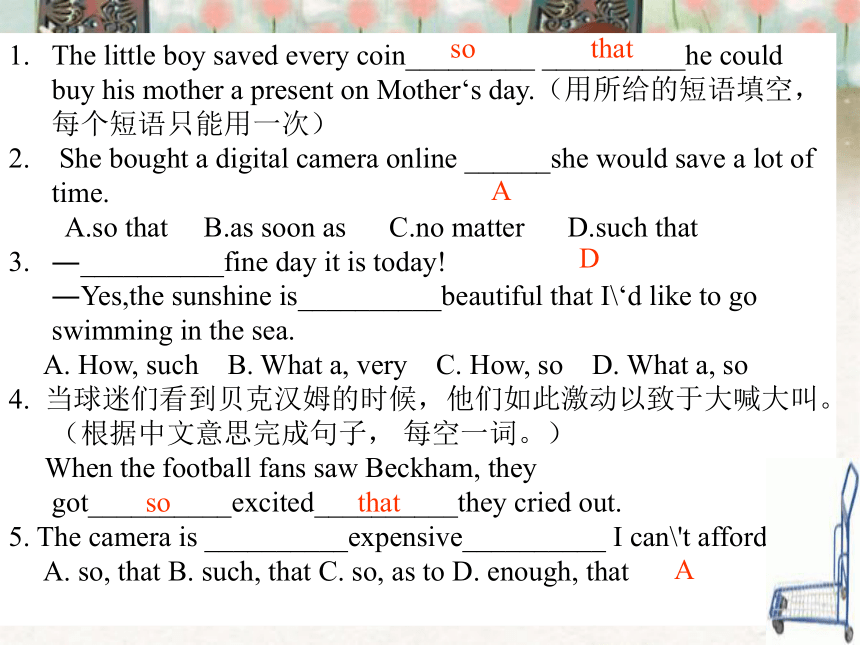
文档简介
(共36张PPT)
1. cut v. 穿过
① vt. &vi. 切,割,剪
Would you please cut the cake in half
cut one’s hair
cut the tree
cut off electricity
cut sth. into pieces
② vt. 割破,划破
cut oneself
③vi. 横穿,穿越(介词用across/through)
cut across/through 直着穿过
The road cuts across/through the forest.
cut a corner 走捷径,超近路
When you learn English, never cut a corner.
row v. 划(船)
① vt.& vi. 划船
My brother is rowing. 划船
② vt. 划船载运
Can you row me across the river
你能划船将我送到河的对岸吗?
He rowed her home.
3. kick v. 踢
4. sight n. 眼界, 视域
catch sight of… 看见:
catch sight of the bird =see the bird
out of sight 在视线之外:
Out of sight, out of mind.
眼不见心不烦
3) in sight 在视线之内:
The bird is in sight. 鸟在视线之内。
4) long sighted 眼光长远, 远视眼
short sighted 目光短浅, 近视
( shortsighted = nearsighted adj.近视的 )
so that …以便,以致…
eg: 1)Ed 借给我一把雨伞,好让我不被雨淋湿。
Ed lent me an umbrella ________ I wouldn’t
get wet in the rain.
2)我将我写的东西复习了一遍又一遍,以便不会出错。
I went over what I had written __________
_____ so that I wouldn’t ________________.
so + adj / adv + that + 句子
3) 这套衣服很贵,我没买。
The suit cost _____ much _____ I didn’t
buy it.
4) 那次旅游很便宜,他们都去了。
The trip cost _____ _____ _____
they all went.
so that
so that
again and
again make any mistakes
so little that
cheap
他努力学习,以便取得好成绩。
He works hard _______ he can get good
result.
2. 老师写得很仔细,是为了让我们看得清楚。
The teacher wrote carefully ________ we
could see clearly.
3. 他太伤心了,以致说不出一个字来。
He is _____________he can’t say a word.
4.妹妹身体太弱了,不能再走了。
My sister is ____________ she can’t walk
farther.
5.他跳得很远,所以得了第一名。
He jumped _____________he
got the first place.
so that
so that
so sad that
so weak that
so far that
Rewrite the following sentences using “so…that…”
1.The camera cost very much. I didn’t buy one.
2.The trip cost very little. They all went.
3.The star is very far away. We can’t see it with out eyes.
4.Ed lent me an umbrella (以便我不会在雨中淋湿).
5.Miyoko bought a camera (以便她能在北京拍照).
The camera cost so much that I didn’t buy one.
The trip cost so little that they all went.
The star is so far away that we can’t see it with our eyes.
Ed lent me an umbrella so that I wouldn’t get wet in
the rain.
Miyoko bought a camera so that she could take
pictures in Beijing.
The little boy saved every coin_________ __________he could buy his mother a present on Mother‘s day.(用所给的短语填空,每个短语只能用一次)
She bought a digital camera online ______she would save a lot of time.
A.so that B.as soon as C.no matter D.such that
―__________fine day it is today!
―Yes,the sunshine is__________beautiful that I\‘d like to go swimming in the sea.
A. How, such B. What a, very C. How, so D. What a, so
4. 当球迷们看到贝克汉姆的时候,他们如此激动以致于大喊大叫。(根据中文意思完成句子, 每空一词。)
When the football fans saw Beckham, they got__________excited__________they cried out.
5. The camera is __________expensive__________ I can\'t afford it.
A. so, that B. such, that C. so, as to D. enough, that
so that
A
D
so that
A
6. Miss Gao asked a question, but it was__________that nobody
could answer it.
A.very difficult B. too difficult C. difficult enough D. so difficult
7. David was so careless that he didn‘t find the mistakes in his test
paper. (变为简单句)
David was__________careless__________find the mistakes in his
test paper.
8. A:The boy is so young that he can\'t look after himself.
B:The boy is not________________to look after himself.
(改写句子,使B句与A句意思相近)
9. The stone is so heavy that I can\'t lift it up. It is__________a heavy
stone__________I can\'t lift it up.(改写句子)
D
too to
old enough
such
that
Grammar in use
the
Any
Some
Grammar in use
Some
Any
some 在表示邀请的语气中可以取代any :
eg:Do you want any drink 你想要喝点什么吗 (不一定愿意给别人喝)
Do you want some 你想要一些吗?(愿意给别人喝,表示邀请 )
some 不用于否定句,只用于肯定句中。
eg:There are some apples in the box.
盒子里有一些苹果。
any通常用于否定句
和疑问句中。
eg:Is there any milk
in the bottle
瓶子里有牛奶吗?
There isn’t any
milk in the bottle.
瓶子里没有牛奶。
Some
Grammar in use
The
1
2
3
4
双特指加 the
在海洋、
河流、
湖海、
山脉前
加 the
在方位词
前加the
The +
单数名词表类别
The
Grammar in use
1
The Atlantic
The Yellow River
The Mediterranean 地中海
the Himalayas
喜马拉雅山
In the south of
在南部
the west 西部
on the left
on the right
Peter went into a classroom two minutes ago. The classroom was so quiet.(前面提到过classroom , 第二次用 classroom 时加 the )
1
1
2
3
2
2
The horse is a useful animal .
马是有用的动物。
1
1
3
4
Grammar in use
5
6
7
专用名词加 the
乐器前面加 the
独一无二的
事物
加 the
在序数词或最高级前加 the
8
Grammar in use
the second
the biggest
1
Play the guitar.
注意:如果乐器是以拼音命名的中国乐器,刚不加the.
the earth
the world
the sun
1
1
6
3
2
1
5
7
8
the Great Wall
Grammar in use
9
10
11
姓氏复数前加 the 表示一家人
年代名词前加 the
阶级党派分类前加the
有些固定搭配要加 the
12
Grammar in use
1
in the 90s.
在90年代
The Communist Party of China : 中国共产党;
the Democratic Party 民主党
Bushes 布什一家
the Wangs 王姓一家
1
1
10
3
2
1
9
11
12
in the end
最终
Grammar in use
13
14
15
打某人的某个部位加 the
The + 形容词比较级
The + 形容词表示具备该特征的一类人
by + the + 单数数量词,表示“以….为计”
16
Grammar in use
1
The sooner , the better .
越快越好。
the missing 失踪的人
the weak 弱者
I hit Tom on the nose . ( 或 in the nose ) 我打中了汤姆的鼻子。
1
1
14
3
2
1
13
15
16
by the second 以秒计
by the month 以月计
Grammar in use
17
18
19
在部分国名前要加 the
20
Grammar in use
1
1
1
18
3
2
1
the United States ; the People’s Republic of China
17
19
20
Intensive Reading
Lesson 30
Intensive Reading
1
2
3
4
5
6
What happened to the man
in the boat
The Wayle is a small river that cutsacross the park near my home. I likesitting by the Wayle on fine afternoons.It was warm last Sunday, so I went andsat on the river bank as usual. Some child-ren were playing games on the bank and there were some people rowing on theriver. Suddenly, one of the childrenkicked a ball very hard and it went to-wards a passing boat. Some people on thebank called out to the man in the boat,but he did not hear them. The ball struckhim so hard that he nearly fell into thewater. I turned to look at the children,but there weren't any in sight:they hadall run away! The man laughed when herealized what had happened. He called out to the children and threw the ballback to the bank.
1. I like sitting by the Wayle on fine afternoons.
1) like to do sth. 喜欢……(一次性的)
I like to drink tea.
2) like doing sth. 喜欢……(习惯性的)
I like drinking water on afternoons
每逢下午都喝水。
2. Some people on the bank called out to the man in the boat, but he did not hear them.
1) call out 大声呼叫,叫喊
I heard someone calling out for help.
2)call out to sb. 对……大声喊
Mary called out to her father, but he was too far away and couldn’t hear her.
3. The ball struck him so hard that he nearly fell into the water.
1) so…that… 如此……以致于…… (that 引导的结果状语从句)
The teacher speaks so fast that I can't catch the word.
My brother walks so slowly that he can't catch up with me.
(赶不上)
The English is so easy that I can learn it well.
so的后面跟副词或形容词, 如后跟名词时要用such +n. +that…
4. I turned to look at the children, but there weren't any in sight: they had all run away!
1) in sight 看得见,在视野之内(反义词为out of sight)
There were not anything in sight.
No bus is in sight.
In the afternoon, we came in sight of the village.
1. cut v. 穿过
① vt. &vi. 切,割,剪
Would you please cut the cake in half
cut one’s hair
cut the tree
cut off electricity
cut sth. into pieces
② vt. 割破,划破
cut oneself
③vi. 横穿,穿越(介词用across/through)
cut across/through 直着穿过
The road cuts across/through the forest.
cut a corner 走捷径,超近路
When you learn English, never cut a corner.
row v. 划(船)
① vt.& vi. 划船
My brother is rowing. 划船
② vt. 划船载运
Can you row me across the river
你能划船将我送到河的对岸吗?
He rowed her home.
3. kick v. 踢
4. sight n. 眼界, 视域
catch sight of… 看见:
catch sight of the bird =see the bird
out of sight 在视线之外:
Out of sight, out of mind.
眼不见心不烦
3) in sight 在视线之内:
The bird is in sight. 鸟在视线之内。
4) long sighted 眼光长远, 远视眼
short sighted 目光短浅, 近视
( shortsighted = nearsighted adj.近视的 )
so that …以便,以致…
eg: 1)Ed 借给我一把雨伞,好让我不被雨淋湿。
Ed lent me an umbrella ________ I wouldn’t
get wet in the rain.
2)我将我写的东西复习了一遍又一遍,以便不会出错。
I went over what I had written __________
_____ so that I wouldn’t ________________.
so + adj / adv + that + 句子
3) 这套衣服很贵,我没买。
The suit cost _____ much _____ I didn’t
buy it.
4) 那次旅游很便宜,他们都去了。
The trip cost _____ _____ _____
they all went.
so that
so that
again and
again make any mistakes
so little that
cheap
他努力学习,以便取得好成绩。
He works hard _______ he can get good
result.
2. 老师写得很仔细,是为了让我们看得清楚。
The teacher wrote carefully ________ we
could see clearly.
3. 他太伤心了,以致说不出一个字来。
He is _____________he can’t say a word.
4.妹妹身体太弱了,不能再走了。
My sister is ____________ she can’t walk
farther.
5.他跳得很远,所以得了第一名。
He jumped _____________he
got the first place.
so that
so that
so sad that
so weak that
so far that
Rewrite the following sentences using “so…that…”
1.The camera cost very much. I didn’t buy one.
2.The trip cost very little. They all went.
3.The star is very far away. We can’t see it with out eyes.
4.Ed lent me an umbrella (以便我不会在雨中淋湿).
5.Miyoko bought a camera (以便她能在北京拍照).
The camera cost so much that I didn’t buy one.
The trip cost so little that they all went.
The star is so far away that we can’t see it with our eyes.
Ed lent me an umbrella so that I wouldn’t get wet in
the rain.
Miyoko bought a camera so that she could take
pictures in Beijing.
The little boy saved every coin_________ __________he could buy his mother a present on Mother‘s day.(用所给的短语填空,每个短语只能用一次)
She bought a digital camera online ______she would save a lot of time.
A.so that B.as soon as C.no matter D.such that
―__________fine day it is today!
―Yes,the sunshine is__________beautiful that I\‘d like to go swimming in the sea.
A. How, such B. What a, very C. How, so D. What a, so
4. 当球迷们看到贝克汉姆的时候,他们如此激动以致于大喊大叫。(根据中文意思完成句子, 每空一词。)
When the football fans saw Beckham, they got__________excited__________they cried out.
5. The camera is __________expensive__________ I can\'t afford it.
A. so, that B. such, that C. so, as to D. enough, that
so that
A
D
so that
A
6. Miss Gao asked a question, but it was__________that nobody
could answer it.
A.very difficult B. too difficult C. difficult enough D. so difficult
7. David was so careless that he didn‘t find the mistakes in his test
paper. (变为简单句)
David was__________careless__________find the mistakes in his
test paper.
8. A:The boy is so young that he can\'t look after himself.
B:The boy is not________________to look after himself.
(改写句子,使B句与A句意思相近)
9. The stone is so heavy that I can\'t lift it up. It is__________a heavy
stone__________I can\'t lift it up.(改写句子)
D
too to
old enough
such
that
Grammar in use
the
Any
Some
Grammar in use
Some
Any
some 在表示邀请的语气中可以取代any :
eg:Do you want any drink 你想要喝点什么吗 (不一定愿意给别人喝)
Do you want some 你想要一些吗?(愿意给别人喝,表示邀请 )
some 不用于否定句,只用于肯定句中。
eg:There are some apples in the box.
盒子里有一些苹果。
any通常用于否定句
和疑问句中。
eg:Is there any milk
in the bottle
瓶子里有牛奶吗?
There isn’t any
milk in the bottle.
瓶子里没有牛奶。
Some
Grammar in use
The
1
2
3
4
双特指加 the
在海洋、
河流、
湖海、
山脉前
加 the
在方位词
前加the
The +
单数名词表类别
The
Grammar in use
1
The Atlantic
The Yellow River
The Mediterranean 地中海
the Himalayas
喜马拉雅山
In the south of
在南部
the west 西部
on the left
on the right
Peter went into a classroom two minutes ago. The classroom was so quiet.(前面提到过classroom , 第二次用 classroom 时加 the )
1
1
2
3
2
2
The horse is a useful animal .
马是有用的动物。
1
1
3
4
Grammar in use
5
6
7
专用名词加 the
乐器前面加 the
独一无二的
事物
加 the
在序数词或最高级前加 the
8
Grammar in use
the second
the biggest
1
Play the guitar.
注意:如果乐器是以拼音命名的中国乐器,刚不加the.
the earth
the world
the sun
1
1
6
3
2
1
5
7
8
the Great Wall
Grammar in use
9
10
11
姓氏复数前加 the 表示一家人
年代名词前加 the
阶级党派分类前加the
有些固定搭配要加 the
12
Grammar in use
1
in the 90s.
在90年代
The Communist Party of China : 中国共产党;
the Democratic Party 民主党
Bushes 布什一家
the Wangs 王姓一家
1
1
10
3
2
1
9
11
12
in the end
最终
Grammar in use
13
14
15
打某人的某个部位加 the
The + 形容词比较级
The + 形容词表示具备该特征的一类人
by + the + 单数数量词,表示“以….为计”
16
Grammar in use
1
The sooner , the better .
越快越好。
the missing 失踪的人
the weak 弱者
I hit Tom on the nose . ( 或 in the nose ) 我打中了汤姆的鼻子。
1
1
14
3
2
1
13
15
16
by the second 以秒计
by the month 以月计
Grammar in use
17
18
19
在部分国名前要加 the
20
Grammar in use
1
1
1
18
3
2
1
the United States ; the People’s Republic of China
17
19
20
Intensive Reading
Lesson 30
Intensive Reading
1
2
3
4
5
6
What happened to the man
in the boat
The Wayle is a small river that cutsacross the park near my home. I likesitting by the Wayle on fine afternoons.It was warm last Sunday, so I went andsat on the river bank as usual. Some child-ren were playing games on the bank and there were some people rowing on theriver. Suddenly, one of the childrenkicked a ball very hard and it went to-wards a passing boat. Some people on thebank called out to the man in the boat,but he did not hear them. The ball struckhim so hard that he nearly fell into thewater. I turned to look at the children,but there weren't any in sight:they hadall run away! The man laughed when herealized what had happened. He called out to the children and threw the ballback to the bank.
1. I like sitting by the Wayle on fine afternoons.
1) like to do sth. 喜欢……(一次性的)
I like to drink tea.
2) like doing sth. 喜欢……(习惯性的)
I like drinking water on afternoons
每逢下午都喝水。
2. Some people on the bank called out to the man in the boat, but he did not hear them.
1) call out 大声呼叫,叫喊
I heard someone calling out for help.
2)call out to sb. 对……大声喊
Mary called out to her father, but he was too far away and couldn’t hear her.
3. The ball struck him so hard that he nearly fell into the water.
1) so…that… 如此……以致于…… (that 引导的结果状语从句)
The teacher speaks so fast that I can't catch the word.
My brother walks so slowly that he can't catch up with me.
(赶不上)
The English is so easy that I can learn it well.
so的后面跟副词或形容词, 如后跟名词时要用such +n. +that…
4. I turned to look at the children, but there weren't any in sight: they had all run away!
1) in sight 看得见,在视野之内(反义词为out of sight)
There were not anything in sight.
No bus is in sight.
In the afternoon, we came in sight of the village.
同课章节目录
